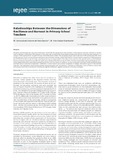Mostrar el registro sencillo del ítem
Relationships between the dimensions of resilience and burnout in primary school teachers
| dc.creator | Vicente de Vera García, María Inmaculada | es_ES |
| dc.creator | Gabari Gambarte, María Inés | es_ES |
| dc.date.accessioned | 2020-05-21T09:23:42Z | |
| dc.date.available | 2020-05-21T09:23:42Z | |
| dc.date.issued | 2019 | |
| dc.identifier.issn | 1307-9298 | |
| dc.identifier.uri | https://hdl.handle.net/2454/36956 | |
| dc.description.abstract | Education professionals are very prone to burnout. Faced with this psychosocial risk, resilience is advocated as a human condition to remake itself in the face of difficulties. The objective of the study was to analyze the relationships between perceptions of burnout and resilience in a sample of 334 teachers from 35 public Primary School Education centers. The accepting sample was composed of 334 teachers (26.34% of the invited sample). It was a cross-sectional, descriptive and correlational study, which responded to a simple random sampling of 1268 teachers in the 2017/2018 academic year, through voluntary and anonymous participation. The instruments used were the Spanish versions of the Maslach Burnout Inventory-General Survey (MBI-GS) and Connor-Davidson Resilience Scale (CD-RISC). Positive relationships were found between emotional fatigue/exhaustion and depersonalization/cynicism and low levels of resilience, as well as between personal fulfillment/effectiveness and high levels of personal competence, confidence in one's intuition and positive acceptance of change, dimensions typical of the resilient response. The importance of promoting resilient coping strategies such as positivism, tolerance to frustration, locus of internal control and self-efficacy, which act as dimensions of protection against exhaustion, negative dimension of burnout, emerges. | en |
| dc.format.extent | 8 p. | |
| dc.format.mimetype | application/pdf | en |
| dc.language.iso | eng | en |
| dc.publisher | T&K Academic | en |
| dc.relation.ispartof | International Electronic Journal of Elementary Education, 2019, 12 (2), 189-196 | en |
| dc.rights | © 2019 Published by T& K Academic. This is an open access article under the CC BY- NC- ND license. | en |
| dc.rights.uri | http://creativecommons.org/licenses/by-nc-nd/4.0/ | |
| dc.subject | Burnout | en |
| dc.subject | Depersonalization | en |
| dc.subject | Emotional tiredness | en |
| dc.subject | Resilience | en |
| dc.subject | Effectiveness | en |
| dc.subject | Positivism | en |
| dc.subject | Control locus | en |
| dc.subject | Coping strategies | en |
| dc.title | Relationships between the dimensions of resilience and burnout in primary school teachers | en |
| dc.type | info:eu-repo/semantics/article | en |
| dc.type | Artículo / Artikulua | es |
| dc.contributor.department | Ciencias Humanas y de la Educación | es_ES |
| dc.contributor.department | Giza eta Hezkuntza Zientziak | eu |
| dc.rights.accessRights | info:eu-repo/semantics/openAccess | en |
| dc.rights.accessRights | Acceso abierto / Sarbide irekia | es |
| dc.identifier.doi | 10.26822/iejee.2019257666 | |
| dc.relation.publisherversion | https://doi.org/10.26822/iejee.2019257666 | |
| dc.type.version | info:eu-repo/semantics/publishedVersion | en |
| dc.type.version | Versión publicada / Argitaratu den bertsioa | es |



